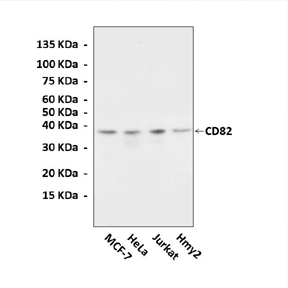Product Sheet CA1307
Description
BACKGROUND Tetraspanins constitute a large family of membrane glycoproteins with four transmembrane domains which are widely expressed in human cells. The tetraspanin family comprises 33 different members, among which the most studied are CD9, CD63, CD81, CD82 and CD151. These proteins have a role in the regulation of many biological processes such as cell-cell adhesion, fusion, signal transduction, proliferation and differentiation. Tetraspanins probably function in the form of complexes since they interact with each other and with different partners including transmembrane proteins such as adhesion molecules, receptors and intracellular signaling/cytoskeletal proteins, creating a network of interacting proteins called the tetraspanin web. Their ability to also interact with cholesterol has led to the concept that tetraspanins might be organizers of specific lipid microdomains which are referred to as tetraspanin-enriched microdomains (TEMs). Tetraspanins also play a role in the dissemination of pathogens that cause malaria and diphtheria and in viral infections. Moreover, several tetraspanins are involved in the life cycle of certain viruses.
CD82, also known as KAI-1, structurally belongs to tetraspanin family while categorized as metastasis suppressor gene on functional grounds. KAI1/CD82 is localized on cell membrane and form interactions with other tetraspanins, integrins and chemokines which are respectively responsible for cell migration, adhesion and signaling. KAI1/CD82 encodes a 267 amino acid protein with four membrane-spanning segments and a single major extracellular domain, with three potential N-glycosylation sites belonging to the transmembrane 4 superfamily.1 Down-regulation of KAI1/CD82 mRNA and protein levels has been reported in the invasive and metastatic stages of various cancers including prostate cancer. In tetraspanin-enriched microdomain, KAI1/CD82 associates with the proteins important for cell migration such as cell adhesion molecule, growth factor receptor, and signaling molecule. Likely, KAI1/CD82 down-regulates the functions of these motility-related proteins to inhibit cell migration. It has been demonstrated that KAI1/CD82 might function as a negative regulator of colorectal carcinoma metastasis, and suppress integrin-induced invasion by regulating signaling to c-Met and Src kinases. Expression of KAI1/CD82 has been reported to reduce cell motility and invasiveness in vivo in melanoma cells. Thus, down-regulation of KAI1/CD82 expression may be an important step in the progression of many types of human malignancy. Indeed altered expression levels of KAI1/CD82 molecule in different types of human cancer have been implicated as having prognostic value and linking to the long term survival of the patients. Increased level of KAI1/CD82 also results in the suppression of secondary tumor growth. Increased expression of this molecule results in reduced cell invasion and cell migration due to endocytosis of epidermal growth factor receptors (EGFR). Thus, KAI-1/CD82 is a pivotal molecule in the regulation of cancer cells\' behavior and has important clinical and therapeutic implications in cancer.2 The loss of KAI1/CD82 expression in invasive and metastatic cancers is due to a complex, epigenetic mechanism that probably involves transcription factors such as NF-kappa-B, p53, and beta-catenin.3,4 Apart from its significant involvement in the suppression of secondary tumors it has also been observed that KAI1/CD82 plays a vital role in virus binding and its entry inside the cell.5
CD82, also known as KAI-1, structurally belongs to tetraspanin family while categorized as metastasis suppressor gene on functional grounds. KAI1/CD82 is localized on cell membrane and form interactions with other tetraspanins, integrins and chemokines which are respectively responsible for cell migration, adhesion and signaling. KAI1/CD82 encodes a 267 amino acid protein with four membrane-spanning segments and a single major extracellular domain, with three potential N-glycosylation sites belonging to the transmembrane 4 superfamily.1 Down-regulation of KAI1/CD82 mRNA and protein levels has been reported in the invasive and metastatic stages of various cancers including prostate cancer. In tetraspanin-enriched microdomain, KAI1/CD82 associates with the proteins important for cell migration such as cell adhesion molecule, growth factor receptor, and signaling molecule. Likely, KAI1/CD82 down-regulates the functions of these motility-related proteins to inhibit cell migration. It has been demonstrated that KAI1/CD82 might function as a negative regulator of colorectal carcinoma metastasis, and suppress integrin-induced invasion by regulating signaling to c-Met and Src kinases. Expression of KAI1/CD82 has been reported to reduce cell motility and invasiveness in vivo in melanoma cells. Thus, down-regulation of KAI1/CD82 expression may be an important step in the progression of many types of human malignancy. Indeed altered expression levels of KAI1/CD82 molecule in different types of human cancer have been implicated as having prognostic value and linking to the long term survival of the patients. Increased level of KAI1/CD82 also results in the suppression of secondary tumor growth. Increased expression of this molecule results in reduced cell invasion and cell migration due to endocytosis of epidermal growth factor receptors (EGFR). Thus, KAI-1/CD82 is a pivotal molecule in the regulation of cancer cells\' behavior and has important clinical and therapeutic implications in cancer.2 The loss of KAI1/CD82 expression in invasive and metastatic cancers is due to a complex, epigenetic mechanism that probably involves transcription factors such as NF-kappa-B, p53, and beta-catenin.3,4 Apart from its significant involvement in the suppression of secondary tumors it has also been observed that KAI1/CD82 plays a vital role in virus binding and its entry inside the cell.5
REFERENCES
1. Malik, F.A. et al: Histol. Histopathol. 24:519-30, 2009
2. Kim, Y.I. et al: Oncol. Rep. 21:159-64, 2009
3. Liu, W.M. & Zhang, X.A.: Cancer Lett. 240:183-94, 2006
4. Miranti, C.K.: Cell Signal. 21:196-211, 2009
5. Grigorov, B. et al: Retrovirology 6:28, 2009
2. Kim, Y.I. et al: Oncol. Rep. 21:159-64, 2009
3. Liu, W.M. & Zhang, X.A.: Cancer Lett. 240:183-94, 2006
4. Miranti, C.K.: Cell Signal. 21:196-211, 2009
5. Grigorov, B. et al: Retrovirology 6:28, 2009
Products are for research use only. They are not intended for human, animal, or diagnostic applications.
Details
Cat.No.: | CA1307 |
Antigen: | Short peptide from human CD82 sequence. |
Isotype: | Rabbit IgG |
Species & predicted species cross- reactivity ( ): | Human |
Applications & Suggested starting dilutions:* | WB 1:1000 IP n/d IHC n/d ICC n/d FACS n/d |
Predicted Molecular Weight of protein: | 38 kDa |
Specificity/Sensitivity: | Detects endogenous levels of CD82 proteins without cross-reactivity with other related proteins. |
Storage: | Store at -20°C, 4°C for frequent use. Avoid repeated freeze-thaw cycles. |
*Optimal working dilutions must be determined by end user.

